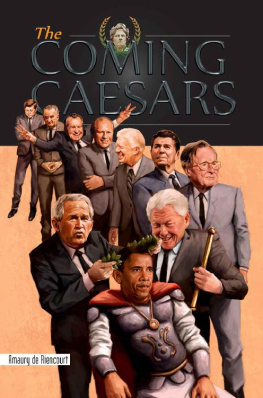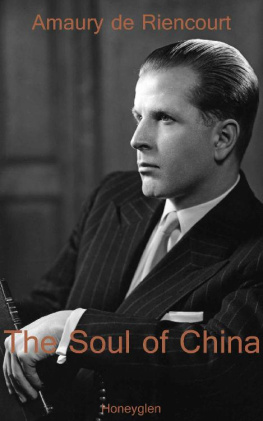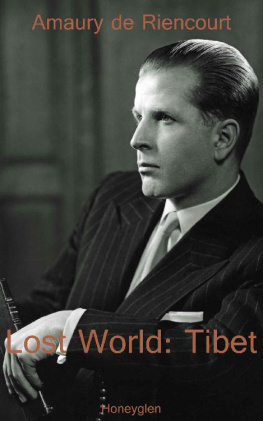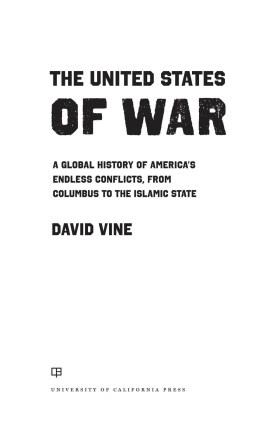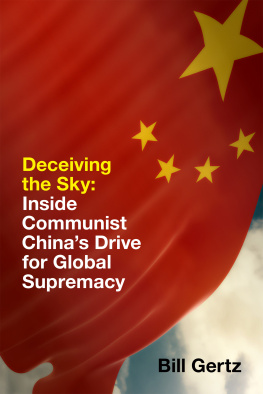THE AMERICAN EMPIRE
By the same author
LOST WORLD: TIBET
THE COMING CAESARS
THE SOUL OF CHINA
THE SOUL OF INDIA
WOMAN AND POWER IN HISTORY
THE EYE OF SHIVA
A CHILD OF THE CENTURY
AMAURY de RIENCOURT
THE AMERICAN EMPIRE
Honeyglen Publishing Limited
digital@honeyglenpub.co.uk
Copyright Amaury de Riencourt 1968
All rights reserved. No part of this publication may be reproduced, stored in a retrieval system, or transmitted, in any form or by any means, electronic, mechanical, photocopying, recording or otherwise, without the prior permission of the copyright owner.
First published in the U.S. by The Dial Press, Inc. in 1968
British Library Cataloguing in Publication Data
Riencourt, Amaury de
The American Empire
British Library Cataloguing in Publication Data
Riencourt, Amaury de
The American Empire
ISBN 978-0-907855-22-4 MOBI (Amazon Kindle,)
ISBN 978-0-907855-23-1 EPUB (Apple iBook,)
ACKNOWLEDGMENTS
Grateful acknowledgements are made for permission to use in this work material included in articles contributed by the author to Orbis, a quarterly journal published by the Foreign Policy Research Institute, and to Life, International Editions. Also, warm thanks are expressed to S.S. and M.A.H. for valued editorial assistance.
CONTENTS
Introduction
Eleven years have gone by since the historical trends I described in The Coming Caesars appeared in print, and worldwide events during these years have brought them out in bold reliefthe twin trend toward Executive predominance in Washington and toward the imperial extension of American influence throughout the world which, in turn, provokes the increasing concentration of ultimate power in the hands of the President of the United States.
The flow of history has moved fast and dramatically during this decade, and moved decisively in the direction outlined in that study of Americas destiny in the light of world history. American presence has made itself felt all over the world with increasing weight. Militarily, the United States landed marines in Lebanon in 1958 and took a hand, under the Eisenhower Doctrine, in temporarily straightening things out in the Middle East; exerted a powerful and even decisive influence in the Congo when the withdrawal of Belgiums colonial administration plunged the heart of Africa into chaos; proceeded to occupy, if temporarily, the Dominican Republic in 1965 to ward off an alleged attempt at a Castroite revolution; and attempted to fasten its grip on Southeast Asia by engaging in large-scale warfare in Vietnam with all its side effectsAmerican military protectorate over Thailand, the collapse of Communist influence in Indonesia, and so on. At a time when European Powers have set free almost all their overseas possessions and liquidated their military bases overseas, the United States not only retains its own imperial outposts from Panama to Okinawa (although acknowledging other nations residual sovereignty) but is also steadily extending its sphere of influence in many of Europes former colonies.
Twenty-three years after the end of World War II, a quarter of a million American troops still garrison West Germany, fifty thousand are on guard in Korea, and well over half a million occupy South Vietnam and Thailand. Americas Seventh Fleet actively promotes the extension of its Far Eastern empire, while its Sixth Fleet has become the main military force in the Mediterranean, far more important than all the European fleets combined. Other, less visible, forms of American influence are spreading increasingly tight networks around the globea vast intelligence, counterespionage and counterinsurgency apparatus, a Pentagon-directed authority over dozens of foreign military establishments, a developing financial and economic empire in foreign lands fueled to the tune of almost nine billion dollars a year, a relentless absorption of foreign talent through the worldwide brain drainevery item of this staggering American expansion being tightly welded to all the others to form one dynamic force in the process of establishing its imperium all over the non-Communist world.
This almost mechanical, partly unconscious expansion of worldwide interests and responsibilities has fostered in the 1960s a renewed flow of power into the White House, at the expense of the other branches of the American government. Toward the end of The Coming Caesars, it was pointed out that wars are the main harbingers of Caesarism.
When the Senate Foreign Relations Committees report was published, few bothered to read it and even fewer cared about the Constitutional issues raised in it. True enough, the New York Times commented upon it several times in its editorials. In its most notable paragraph, it had this to say about the report:
Haunting second thoughts in Congress and the country about the Gulf of Tonkin resolution of 1964under protection of which the administration has steadily expanded the American commitment in Vietnamwould alone justify searching debate. But the need is reinforced by enduring doubts about President Roosevelts shoot on sight orders to the Atlantic Fleet prior to the formal American involvement in World War II; President Trumans commitment of American forces to war in Korea without even a request for congressional sanction, and the joint resolutions on Formosa, the Middle East and Cuba adopted on the initiative of Presidents Eisenhower and Kennedy.
It is also true that, by breaking out of the narrow confines of the mere moment and reaching back to the troubled period ending in the outbreak of World War II, the Senate Foreign Relations Committee displayed a true and valuable sense of history. But, in its attempt to undo the harm done, it also overreached itself, as the same New York Times editorial pointed out; and it felt compelled to warn the distinguished Senators that:
The hard fact is that a President today can maneuver the country into war without a declaration or resolution by the Congress, and the senators can devise no foolproof deterrent against this.
It could have added that another hard fact is that, by and large, public opinion has become indifferent to the Constitutional issues raised. Basically, it longs for leadership and follows it more or less blindly whenever it asserts itself with sufficient demagogic forcefulnessall the passionate controversies stimulated by the Vietnam War notwithstanding. Public opinion cares mostly about the staggering cost of the war, the racial riots in American cities, inflation and taxes. The Constitutional issue of the eroded division of powers and the rising Caesarian stature of the President are largely matters of indifference to the broad public.
The fact that Democratic Presidents were singled out as the main culprits by a Democratic-dominated senatorial committee was in itself significant, symbolizing another of those episodic attempts on the part of Congress, without real public support, to curb the growing powers gathering at the White House, regardless of the fact that the President belongs to the same party. This attempt, besides temporarily disrupting the unity of the Democratic party, also exemplifies one of the main themes of The Coming Caesarsthe tight relationship between expanding democracy, growing imperialism, and rising Caesarism. In sponsoring this report on a unanimously approved resolution, Senator Fulbright and his Democratic colleagues behaved more like Republicans than Democratsproving in the process that American lawmakers are so concerned by the evaporation of their Constitutional powers and the rising threat of Caesarism that they might be willing to sacrifice party unity in the slender hope of recapturing their waning prerogatives.
Next page

